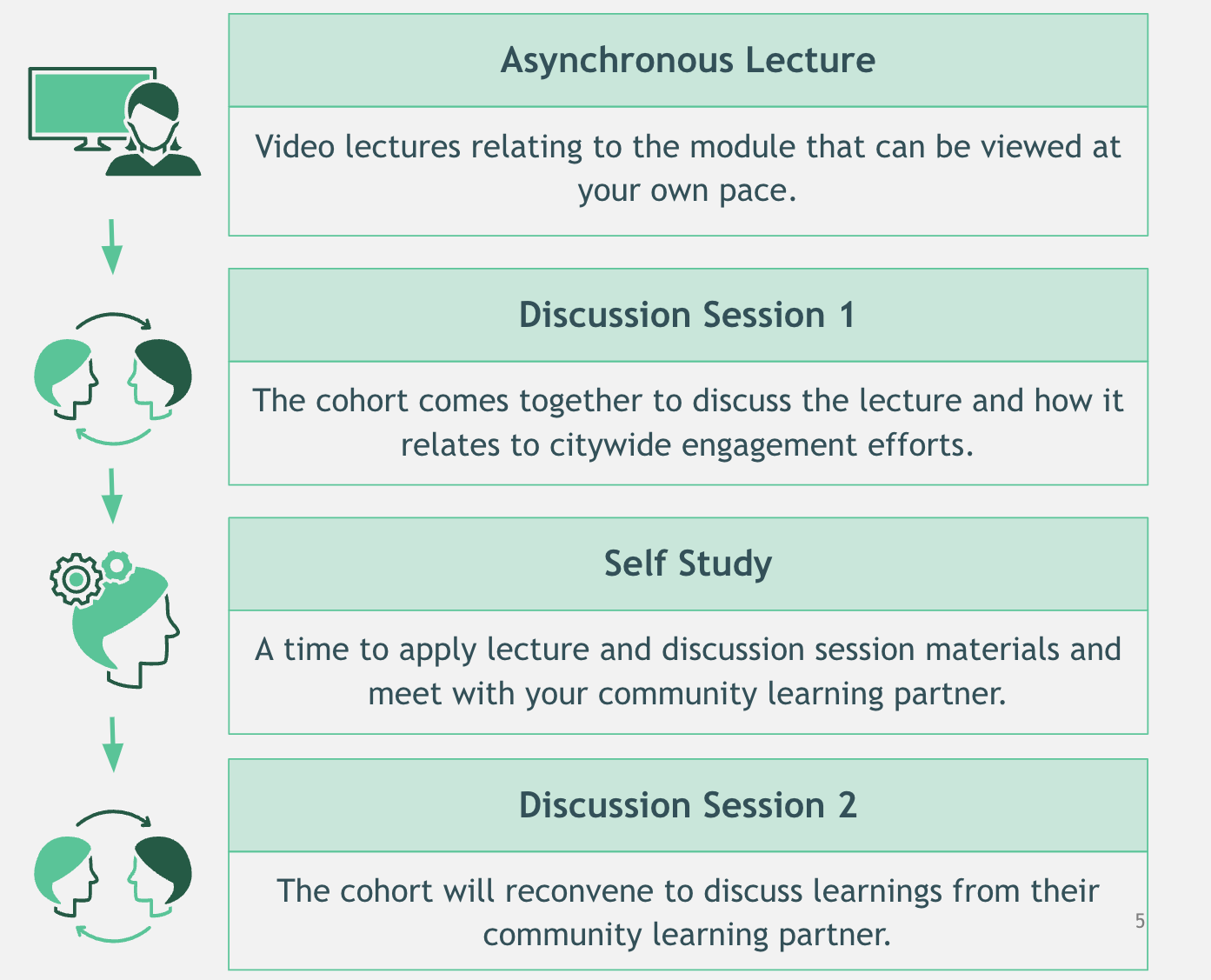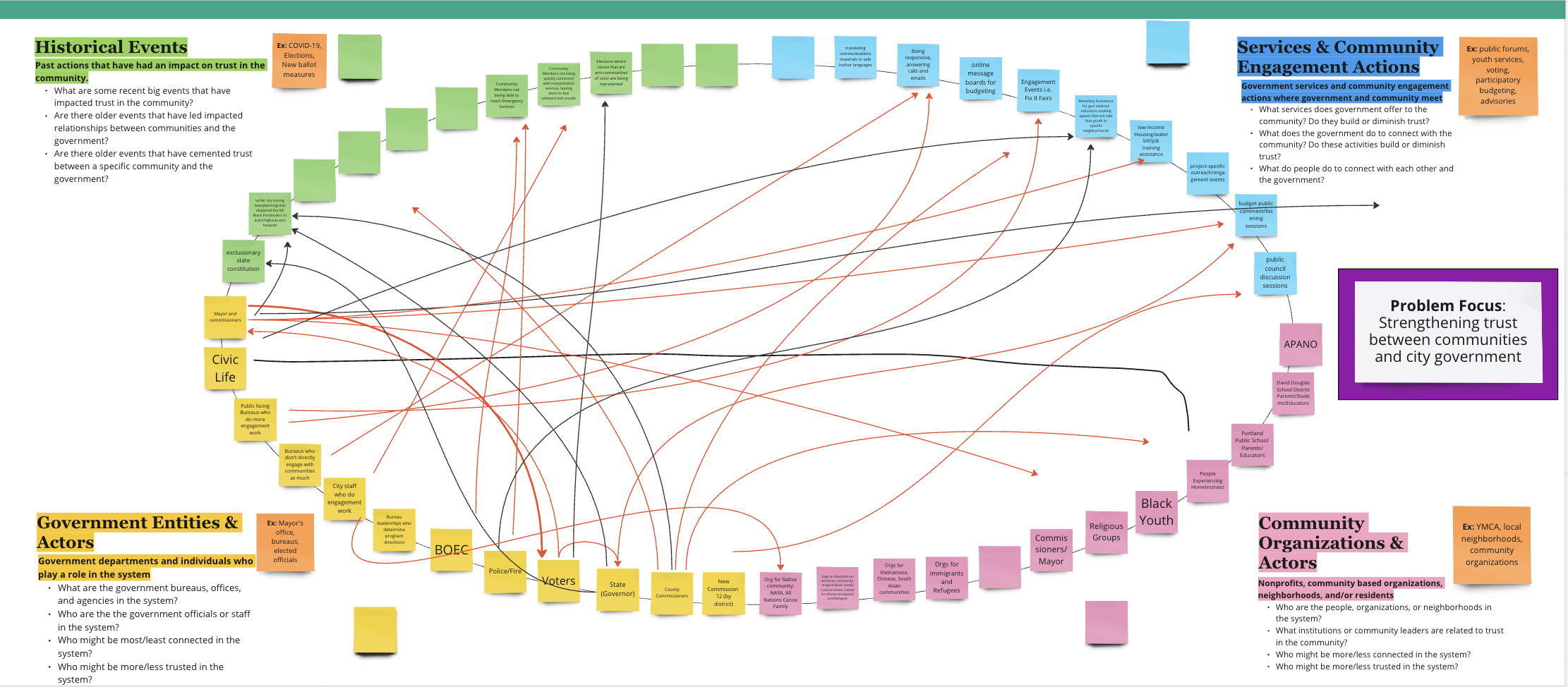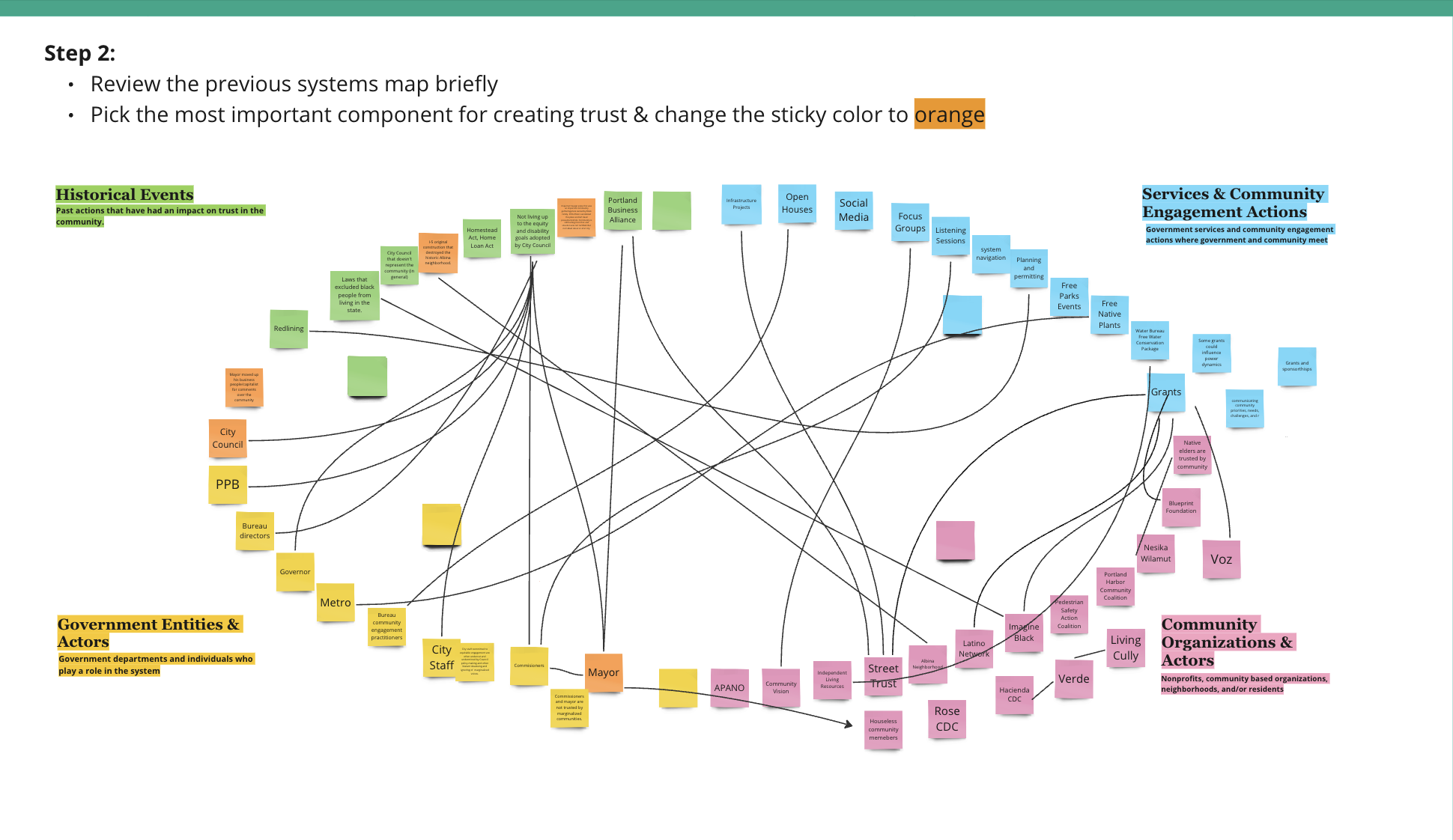

The Citywide Equitable Engagement Cohort: Portland, Oregon

Embrace principles of equity and anti-racism in your community engagement.
Are you a public servant seeking to better uplift the voices of marginalized groups and share power with communities? Contact us for support!
Background and context
Introduction
We define government legitimacy as the open, trusting relationship between government and communities. A component of earning government legitimacy is community engagement. Without it, government would be ignorant of the needs of community members, especially those that have been pushed to the margins by those with power. As the level of government closest to the people, local governments often engage with community members the most. Community engagement practitioners and government policymakers depend on the lived experience of community members to inform policies, initiatives, and projects. When working with historically marginalized and excluded communities, it is important to center equity and the needs of the community. By not doing this, engagement practitioners and government institutions risk perpetuating patterns of harm, tokenization, and extraction.
When a government has earned legitimacy, communities feel their voice matters and is represented by government. When this relationship is strong, government and communities can work together effectively. When communities have decision-making power, they can address challenges together with governments. Governments are in the process of earning legitimacy and becoming more representative of people who have been disenfranchised. The Centre for Public Impact’s concept of earned legitimacy is intent on uplifting the voices of marginalized groups and helping governments share power with communities.
City Community Engagement Practitioners“Government is not representative of the people it serves and the community members they do collaborate with often do not represent those who have the greatest need or who have faced the greatest challenges.”
The City of Portland’s Office of Community and Civic Life had an interest in uniting city employees from different bureaus to discuss and share methods of community engagement that center equity and empower historically marginalized residents. The Centre for Public Impact (CPI) partnered with the Office of Community and Civic Life to bring this work to 25 engagement practitioners during a period of transition and growth in the City of Portland. The Portland Citywide Equitable Engagement Cohort (CEEC) served as a space for community engagement practitioners to share tools to build government legitimacy, create cross-bureau relationships, and share methods of equitable engagement. CPI served as a learning partner to support institutionalized trust-building mindsets and practices within Portland to strengthen relationships between the government and the community.
Transition and growth in the City of Portland
Before the program officially began, Portlanders voted to restructure the city government by passing a measure to revise the city charter. Portland’s structure previously had five council members representing the entire city while working in legislative and executive roles, meaning that they were charged with running bureaus while also needing to pass laws. With this charter change, the city council will have 12 members, with three council members per geographic district. Voters also decided to move towards rank-choice voting, where they would rank their candidates in order of preference. The mayor’s role changed to one focused on leading the executive branch and the daily functioning of city government. The mayor no longer has the power to vote on the city council, unless they need to break a tie.

These structural changes happened as CPI was planning the program and affected how we approached the work. We entered and created spaces for Portland practitioners with humility, curiosity, and empathy to ensure that participants had space to process the changes in structure that impact their daily work and the community members they interact with. The transitory and growth period in Portland’s government made it ever more important to collaborate with the Office of Community and Civic Life to create a network between practitioners and bureaus. Because this transition period encompassed a reorganization of bureaus, we created groups based on the new city structure to begin establishing bonds between practitioners that may be collaborating in the future. Fundamentally, the structure and goals of our work remained consistent. However, we were conscientious of the changes happening and quickly pivoted our topics of discussion or session structure as needed.
The program’s structure and goals
The CEEC was a three-month program with four goals:
Cocreate a unifying structure for cross-bureau collaboration and engagement coordination
Share tools and concepts to build legitimacy tailored to practitioners’ needs
Understand community perspectives by developing deeper relationships with community leaders
Share storytelling practices to share the importance of strong community engagement with city leadership and the community
The CEEC was made up of asynchronous lectures, synchronous discussion sessions, and self-study weeks. Material and tools were shared with participants via recorded lectures at the beginning of a module. Participants then joined two discussion sessions per module to apply what they learned in the lecture in group activities and examine other relevant topics.

Participants were asked to work alongside a community learning partner throughout this program and conduct listening sessions and a cocreation session. The self-study week provided participants with space to conduct these sessions. A community learning partner is someone who is actively engaged with a community they belong to. CPI created this program with a variety of learning methods and ways of participating to increase accessibility to the materials and to make the program more flexible.
How the program began
The Office of Community and Civic Life approached CPI in early 2022 showing interest in our government legitimacy work and our mission to reimagine government so that it works better for everyone. Because the City of Portland is working towards enabling flourishing for all Portlanders through community engagement, the Office of Community and Civic Life aimed to codesign an innovative, equitable, and responsive engagement structure for all Portlanders.
CPI held cocreation sessions in July 2022 with potential participants to codesign the program. As learning partners, participants often share with us what they want out of this program so CPI could create work that is meaningful and impactful to them. During these sessions, participants shared the following needs, which we took into account when designing the program:
Interested in learning best practices from other cities and what communities find critical for collaboration
Help develop more collaborative spaces and practices among engagement practitioners across bureaus
Help get buy-in from elected officials and leadership for meaningful engagement
Additionally, we held two onboarding sessions in December 2022 to prepare participants for the program starting in January 2023. During these onboarding sessions, CPI shared the definition of earned legitimacy and introduced the concept of historical analysis, something they further explored during the program’s first module.
Government legitimacy is the open, trusting relationship between government and communities. When a government has earned legitimacy, communities feel their voice matters and is represented by government.
CPI approached these pre-program sessions with openness and curiosity, as our main focus was to learn from engagement practitioners and to prepare them for the upcoming work. As a learning partner to local governments, we create a brave and trusting space so that participants can feel comfortable learning with us and with the other participants. Approaching the pre-program sessions with openness and curiosity was one way we began to establish our relationship with participants.
Program modules
Note: Read our CPI dictionary for definitions of common terms used in community-centered design, innovation, and earned legitimacy.
The CEEC was broken up into three modules, each with a unique focus, but relating to the prior module.
Module one - understanding and historical analysis: Participants learned about methods of historical analysis and systems thinking to understand and analyze community engagement efforts in the city to date.
Module two - cocreating equitable engagement tools: Participants learned about creative cocreation tools, from ideation and codesign to deliberative democracy techniques.
Module three - scaling engagement across city bureaus: Participants learned about storytelling as a vehicle to gain leadership and community buy-in for engagement efforts.
Capstone presentation: Participants will give a capstone presentation sharing their learnings and suggesting next steps in updating the engagement frameworks with city leadership
During these modules, participants learned various tools to enhance their current community engagement efforts. Additionally, CPI intentionally created a space for them to share and learn best practices for cocreating with and listening to residents, and connecting by sharing their experiences with storytelling. At the end of the program, participants created a capstone presentation in small groups to share their learnings from the program and recommendations for changes to engagement in the city of Portland. Capstone presentations were delivered to the entire cohort, Portland leadership from the Office of Civic and Community Life, and the CPI team who worked on this project.
Module one: understanding and historical analysis
Our first module focused on understanding the current local context through historical analysis, analyzing power dynamics through systems mapping, learning from community members by hosting listening sessions and synthesizing comments from the listening sessions into themes. CPI includes historical analysis in programming because participants must clarify how and why our current systems and institutions came to be before thinking of ways to reimagine them. Additionally, it prompts participants to challenge individual assumptions around a topic or problem scope.
One key lesson shared during this module was that historical analysis allowed the cohort to better understand how past harms and actions experienced by residents inform their perspectives and needs today. The cohort emphasized the importance of using past community actions and feedback to inform future government policies and/or initiatives. This learning was strengthened by the addition of the systems mapping tool. With this tool, participants visualized historical and current systems and identified power dynamics within their city.
 A systems map from Portland
A systems map from Portland
Participants also hosted listening sessions with their community learning partners. From these sessions, four themes emerged that informed the upcoming modules.
Theme one: building and/or repairing community trust to ensure inclusive decision making
Theme two: making knowledge, information, and resources more available
Theme three: implementing feedback and communicating changes
Theme four: addressing historical and recent traumas
The themes became the problem focus for newly-created small groups within the cohort and informed future cocreation sessions and capstone projects.
Module two: cocreating equitable engagement tools
Our second module focused on teaching participants cocreation tools ranging from insight combination and problem zooming to asset mapping. Participants discussed the power of cocreating with their community learning partner, shared best practices, and heard from a guest speaker on the practical applications of this program.
CEEC group one"Asset mapping helps with identifying community assets, community organizations, and those most affected by City policies and practices."
Participants conducted a cocreation session with their community learning partners to create solutions for their problem focus of choice. Participants were to conduct these sessions in their chosen small groups with the problem focuses created in module one.
 An asset map from Portland
An asset map from Portland
An additional resource from the program was the asset map. Participants were introduced to the asset map to grow their knowledge of the strengths and resources in a community. For example, when asset mapping, participants brainstormed the “superpowers” of a community; CPI emphasized the importance of this tool because it can help the practitioners understand their community’s culture, hold their history, and gain trust.
Module three: scaling engagement across city bureaus
Our third module focused on teaching practitioners about storytelling using a capstone presentation to get leadership and community buy-in for engagement efforts. Practitioners also discussed the biggest hurdles for scaling anti-racist engagement across the city, developed storytelling plans, and envisioned their ideal Portland.
During the discussions in this module, CPI facilitated conversations around anti-racist engagement practices, anti-racist storytelling, and the hurdles engagement practitioners faced in spreading these practices. Participants discussed how traditional engagement does not give practitioners enough time to learn about people’s stories and often prioritizes urgency over the slowness needed to build trust. Moreover, participants conversed about the traditional narratives used in storytelling that may focus on the pain of historically marginalized communities instead of uplifting their triumphs.
Finally, this module was unique in that it focused on funneling all the skills participants learned throughout the program, and had before the program, into one final capstone project. The capstone project was a culmination of everything participants experienced throughout the program. CPI introduced the capstone as a vehicle for participants to share learnings, tools they found helpful, and recommendations for creating an equitable engagement framework in the city of Portland.
Program impact
After the Citywide Equitable Engagement Cohort, participants combined all their ideas within their small groups. Participants joined a Capstone Presentation Day, a dedicated one and half hour session for participants to share their experiences in the cohort, share stories from their community learning partner, and provide recommendations for changes to the engagement structure in the City of Portland.
Three groups participated in Capstone Presentation Day with an audience of their peers, the CPI team, and leadership from Portland’s Office of Community and Civic Life. One group was not able to participate due to capacity limitations.
Group one: building and/or repairing community trust to ensure inclusive decision-making at the City
Members: City practitioners from Parks, Civic Life, Development Services, Housing Bureau, and Environmental Services
Group one: problem focus
Group one’s capstone presentation topic related to inclusive decision-making in the City of Portland. They focused on the question: How can the City of Portland build meaningful and trusting relationships with Portland’s diverse communities to ensure their voices have a real impact on policy-making?
Group one: reflections and recommendations
Here are Group one’s reflections and recommendations shared during their capstone presentation:
Concerned that the government may not be representative of the people it serves and that those the government often works with are “people who will validate the perspective the city already has, rather than challenge it or bring forth new ideas.”
Emphasized the need for systems thinking and that the systems mapping tool presented can, “provide an exploration of the system, communicate understanding, and allow for the identification of knowledge gaps, intervention points, and insights.”
Encourage people to understand the connections of different systems that impact our everyday lives to create a new way of thinking.
Stated that most affected communities often are the least heard and that individuals invited to decision-making spaces are taken to be representative of large, complex communities.
Suggest that there needs to be more robust engagement with multiple community members.
Noted that lazy engagement became normalized.
Propose that engagement practitioners should first research the community before engaging with them to avoid repeating the same questions and exercises.
Recognized that transactional and tokenistic engagement is the standard approach.
Advocate for enough resources to combat this form of engagement to build trust and true partnership which is “mutualistic and transformative.”
Group one: final recommendation
Their final recommendation was: “that the engagement process be consistently evaluated by a professional community engagement manager—hired for each bureau.”
CEEC group one"To build authentic trust with the community and bring those that are most impacted to the table and into these rooms, we need your buy-in."
The group said that this recommendation could ensure that engagement is not transactional, ensure accessibility, acknowledge cultural differences, and guarantee accountability in engagement.
Group two: making knowledge, information, and resources more available
Members: City practitioners from Management and Finance/311, Parks, Civic Life, and Fire & Rescue
Group two: problem focus
Group two took a different approach to the capstone project, choosing to focus on conversations they had with their community learning partners. They focused their conversations on building trust between the community and the city government by making information, knowledge, and resources more available. Their presentation focused on their experience with the community learning partner aspect of the program.
Group two: reflections and recommendations
Here are Group two’s collective findings and recommendations from their community learning partners, which they shared during their capstone presentation:
Each bullet listed below comes from a different group member.
Opened a nonprofit serving the East African community because they felt neglected by the city government, wanted to bridge the gap between the community and government, and earn a seat at the decision-making table.
Suggested more collaboration between refugee and immigrant communities and other underrepresented groups exists; these multicultural gatherings can help share the strength and beauty of communities.
Disclosed that the Latiné community in Portland often equates city government staff with law enforcement, which inhibits trust building.
Recommended that government works to be clear that seeking resources or help offered is not tied to law enforcement, deportation, or criminalization.
Highlighted that the City needs an effective translation policy to ensure Spanish-speaking communities have access to public info and resources.
Member of CEEC group two“The lack of multilingual content disempowers community members from fully participating.”
Expressed frustration with the roadblocks and hoops that unhoused folks encounter to learn about resources and access to said resources, programs, and assistance.
Underscored that feedback and input solicited from the city is not reflected in the project it was for.
Indicated the importance of feedback loops to avoid feeling “like efforts are going into a void or dark hole and not acted upon or considered.”
Disclosed that they did not participate in the listening or cocreation sessions. This participant felt that the process was extractive, transactional, and rooted in white supremacy.
Interested in cultivating a relationship slowly and intentionally that allows for trust to grow organically.
Group two: final recommendation
While there was not an explicit final recommendation presented by this group, there are overlapping recommendations for making resources more available. Group two members generally recommended that communication and relationship building be collaborative, accessible, slow, and circular to make information, knowledge, and resources more available.
Group three: implementing feedback and communicating changes
Members: City practitioners from Planning & Sustainability
Group three: problem focus
Group three focused on the need to implement feedback and communicate changes to community members. Their work was informed by the listening sessions and cocreation sessions held.
Group three: reflections and recommendations
Here are reflections and recommendations shared during their capstone presentation:
Articulated that communication often does not flow equally in both directions
Called for the creation of clear expectations on communication and multiple avenues of communication for accessibility.
Stated that community members often felt commitments are sometimes made without noticeable follow through
Suggested the creation of a consistent feedback loop during the project process and the proper allocations to get the work done.
Mentioned the systems mapping exercise helped identify power dynamics and create spaces to share power.
Proposed using it to create comfortable spaces where power can be shared in a collaborative way
Group three: final recommendation
The practitioner’s final recommendation was simple: “Remove the barriers for participation by placing a community feedback section on every project page that is a clear listing of what we have heard from the community AND responses from staff.” She proposed creating a system of circular feedback where community members can provide feedback on a project or initiative and receive responses or updates from the staff leading these projects. They believe it would eliminate the communication gap between community members and government staff.
Common themes among all groups
While all groups had unique approaches and results from their capstone project, there were some notable common threads.
Most groups focused on the need for systemic changes in government and engagement practices. Groups mentioned the systems mapping tool CPI presented as a means to understand the systems we live in and the power dynamics that exist within them.
All groups centered on the experiences and voices of historically marginalized community members throughout their work. The notion of sharing power was present throughout each group’s capstone project. It was an integral theme for the Citywide Equitable Engagement Cohort.
Participants stated that access to resources and support needs to be embedded in engagement practices. Accessibility can take different forms—translation services, clear feedback loops, and reduced barriers to access.
Although participants focused on different topic areas, their findings, and presentations intersected, which speaks to the connectedness of all the engagement issues across bureaus.
Further learnings
Program impact
At the end of each session, CPI conducted short polls to record how participants felt about the sessions they participated in. We asked the following:
Questions | Strongly agree | Agree |
|---|---|---|
Today’s session gave me a greater understanding of how I can achieve a program goal. | 18.78% | 71.32% |
I learned useful information from today’s discussion session. | 28.03% | 64.03% |
I learned helpful information from fellow participants in this program. | 44.82% | 53.99% |
I am satisfied with the quality of this session. | 25.32% | 70.45% |
I would recommend this session to a colleague. | 16.20% | 76.88% |
On average, most participants said they “Agreed” or “Strongly agreed” with the aforementioned statements.
Lessons learned
As CPI continues to expand its work in Government Legitimacy, there was a key lesson learned that CPI will use moving forward in future programming. During the Citywide Equitable Engagement Cohort, CPI learned to further consider the institutional context of the place we are working with, as a result of connecting with practitioners throughout the program.
In regard to this particular program, it was important for us to have fully understood the experiences of engagement practitioners period before starting the program. Feedback the CPI team received during the program showed us that practitioners desired conversations about the systems of power at play in the City of Portland.

Going forward, having the full picture of the institution we are working with will help CPI build programming that is better prepared for working with our participants. CPI believes that this could be addressed with longer onboarding phases, programs that identify the root causes of issues instead of only addressing symptoms, and more deep and trusting relationships with participants. This may be done by more deeply centering equity, and creating trauma-informed learning cohorts. In doing so, we aim to create work that is more people-centered and community-centered all from a trauma-informed lens.
Because we work, play, and live in an interconnected system, understanding the context and history of each system is critical to developing and conducting Legitimacy programs. As learning partners to government, we do our best to learn about the cultural, societal, and political norms of each city we partner with, and sometimes things slip past us. We are excited to continue growing as learning partners and find new ways to learn about the norms of the cities and the people we work with.
Conclusion
The Citywide Equitable Engagement Cohort was a program that sought to bring together individuals from the different bureaus in the City of Portland, share equitable engagement tools to supplement their existing work, and share storytelling practices to gain buy-in from leadership. Overall, the program met its goals of connecting people and sharing new strategies. With broad modules, CPI was able to cover a breadth of topics that relate to equitable engagement and collaborate with participants to discuss these topics. At the end of the program, the discussions and materials culminated in capstone presentations that included the benefits of tools CPI shared and the recommendations participants made to change the state of engagement in the City of Portland.
Embrace principles of equity and anti-racism in your community engagement.
Are you a public servant seeking to better uplift the voices of marginalized groups and share power with communities? Contact us for support!
You may also be interested in...


Urban agriculture in Havana

Public Transport in London

Transportation in New York

Nota Carioca: electronic tax administration in Rio de Janeiro
